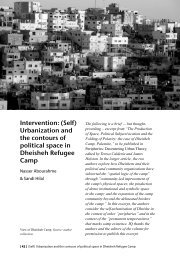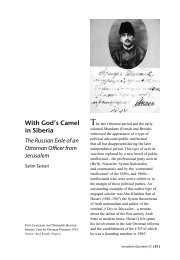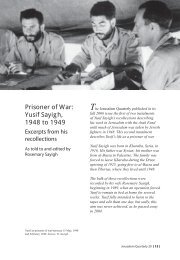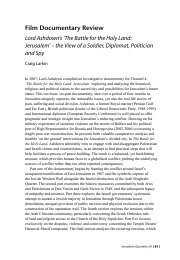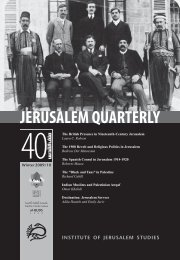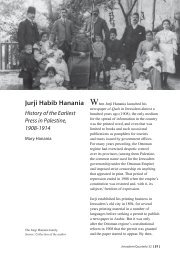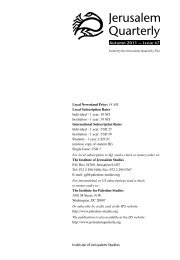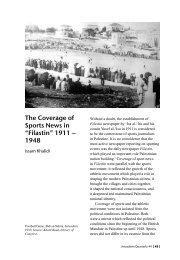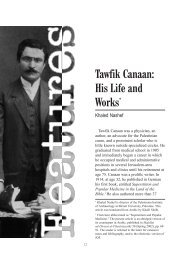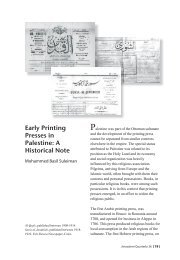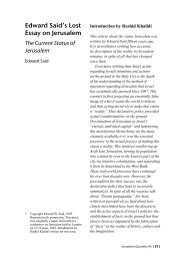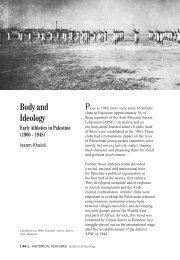PLUNDERING PALESTINE - Jerusalem Quarterly
PLUNDERING PALESTINE - Jerusalem Quarterly
PLUNDERING PALESTINE - Jerusalem Quarterly
You also want an ePaper? Increase the reach of your titles
YUMPU automatically turns print PDFs into web optimized ePapers that Google loves.
The most prominent of these was Orde Charles Wingate who, according to Pappe:<br />
made the Zionist leaders realize more fully that the idea of Jewish statehood<br />
had to be closely associated with militarism and an army, first of all to protect<br />
the growing number of Jewish enclaves and colonies inside Palestine but<br />
also… because acts of armed aggression were an effective deterrent against<br />
the possible resistance of the local Palestinians.<br />
Pappe concludes, “from there the road to contemplating the enforced transfer of the<br />
entire indigenous population would prove to be very short indeed.” (p. 15) Wingate<br />
succeeded “in attaching Hagana troops to the British forces during the Arab revolt<br />
so that they could learn even better what a ‘punitive mission’ to an Arab village<br />
ought to entail. For example, “in June 1938 Jewish troops got their first taste of<br />
what it meant to occupy a Palestinian village: a Hagana unit and a British company<br />
jointly attacked a village on the border between Israel and Lebanon, and held<br />
it for a few hours.” In a press release almost 70 years later (26 June, 2007), the<br />
Palestinian human rights organization al-Haq reported that:<br />
throughout March 2007, the Israeli occupying forces carried out four<br />
military training exercises in the village of Beit Lid in the Tulkarem area.<br />
The military manoeuvres usually lasted from approximately 2:00 am to<br />
7:00 am and involved 400-500 Israeli soldiers entering the village on foot<br />
in groups of about 15-20. The exercises included training with humanshaped<br />
cardboard cut-outs, the simulations of evacuation and transfer of<br />
injured persons. To date, the soldiers have not entered any houses in Beit<br />
Lid, except an abandoned house in the middle of the village, or attacked<br />
any of the villagers.<br />
Judging from the prevalence today of the same tactics Jewish forces used to perpetrate<br />
the ethnic cleansing of Palestinians from the territory where Israel was established,<br />
it would appear that the next phase of the ethnic cleansing of Palestinians from the<br />
occupied territories is imminent, should propitious conditions arise.<br />
But these similarities are not only military, but also diplomatic. One example<br />
involves the legal status of the territories Israel occupied. After the occupation of the<br />
West Bank (including East <strong>Jerusalem</strong>) and the Gaza Strip in 1967, Israel refused to<br />
accept that it was bound by the Fourth Geneva Convention. Instead it declared that<br />
it would abide only by the humanitarian provisions of that legal instrument. This<br />
brings to mind the distinction that has been made regarding Palestinian refugees,<br />
where their refugee status is denied and Israel insists on treating them as a “humane<br />
problem.” Pappe writes:<br />
[ 68 ] REVIEWS Looking at Evil Without Blinking



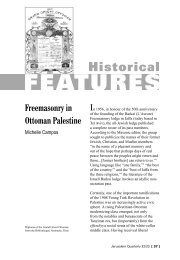
![In Search of Jerusalem Airport [pdf] - Jerusalem Quarterly](https://img.yumpu.com/49007736/1/180x260/in-search-of-jerusalem-airport-pdf-jerusalem-quarterly.jpg?quality=85)
